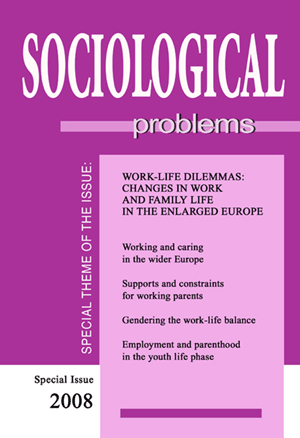Work/Life Balance as a Gendered Agenda: The case of Slovakia
Work/Life Balance as a Gendered Agenda: The case of Slovakia
Author(s): Kvetoslava RepkováSubject(s): Social Sciences
Published by: Институт по философия и социология при БАН
Keywords: persons with family responsibilities; gender issue; gender differential indicators; formalised family care; long-term care
Summary/Abstract: The main interest of the author is to present the work/life balance agenda primarily as a gendered agenda, which means an agenda having different connections and impact on women and men. There is a lot of evidence for different positions of men and women with regard to ensuring care (especialy the long-term care of dependent family members) and house-keeping responsibilities on one hand, and ensuring financial sustainability of family life, on the other. Currently the whole care sector is over-represented by women: from the viewpoint of women as care-givers (they provide most longterm care for dependent persons in formal and informal settings), and from the viewpoint of women as care-consumers (because of their greater longevity, and a higher rate of disability-conditions). At the same time in Europe there are high expectations from women of a working age to increase their participation in the labour market, as a high skilled and qualified labour force to achieve the overall Lisbon economic goals. Besides of these facts there is often hidden evidence about traditional forms of high pressure developed towards men in their professional life and performance to compensate for the income gap caused by a woman´s absence in the open labour market (e.g. in the situation of long-term care for a child with severe disabilities). The author´s intention is to describe selected Slovakian social policy measures supporting men and women in dealing with the above mentioned dilemma.
Journal: Социологически проблеми
- Issue Year: 40/2008
- Issue No: Spec. 3
- Page Range: 131-144
- Page Count: 14
- Language: English
- Content File-PDF

